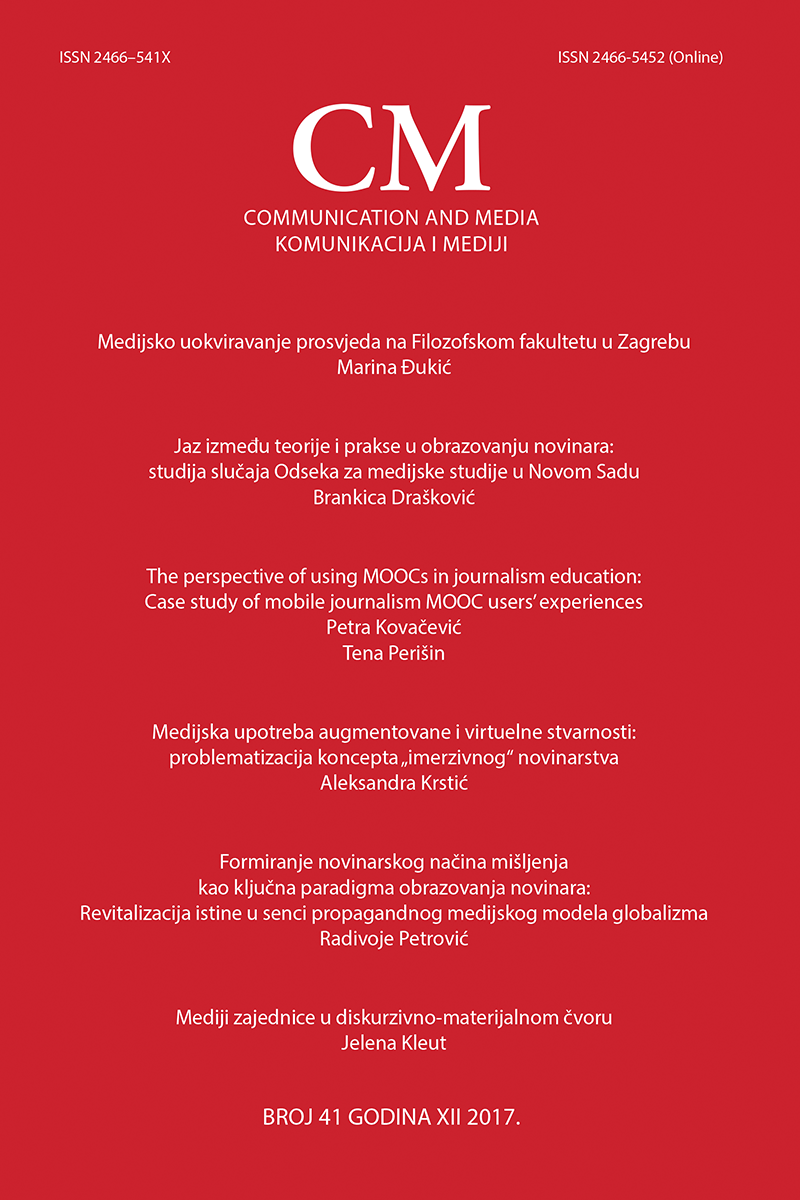The perspective of using MOOCs in journalism education: Case study of mobile journalism MOOC users' experiences
Sažetak
Through analysing massive open online courses (MOOC) participants’ experiences and perceptions of a 20-week course in mobile journalism, this paper examines the potential obstacles, challenges and opportunities in providing education in this specific field. Results confirm the problematic low retention rate for MOOCs and show that this type of course demands more effort from participants by asking them to complete practical assignments away from the comfort of their homes. The content of the course, as well as quality communication with tutors is key for motivation and progress of participants in this MOOC. Consideration of technical resources for this type of remote training (smartphones and other equipment) is recommended, along with more interactive sessions that enhance the learning experience by connecting closer not only participants with tutors but participants with each other.
Reference
Aharony, N. & Bar-Illan, J. (2016). Students’ perceptions of MOOCs: An exploratory study. Interdisciplinary Journal of e-Skills and Life Long Learning, 12: 145–162.
Alraimi, K., Zo, H. & Ciganek, A. (2015). Understanding the MOOCs continuance: The role of openness and reputation. Computers & Education, 80, 28–38.
Blankenship, J.C. (2016). Losing their “MoJo”?. Journalism Practice, 10(8): 1055–1071.
Breslow, L., Pritchard, D. E., DeBoer, J., Stump, G. S., Ho, A. D. & Seaton, D. T. (2013). Studying learning in the worldwide classroom: research into edX's first MOOC. Research and Practice in Assessment, 8:13–25.
Carey, J. (2000). Some personal notes on US journalism education. Journalism: Theory, Practice & Criticism, 1(1):12–23.
Conboy, M. & Eldridge, S. (2014). Morbid Symptoms: Between a dying and a re-birth (apologies to Gramsci). Journalism Studies, 15(5): 566–575.
Daradoumis, T., Bassi, R., Xhafa, F. & Caballe, S. (2013). A Review on Massive E-Learning (MOOC) Design, Delivery and Assessment. 2013 Eighth International Conference on P2P, Parallel, Grid, Cloud and Internet Computing.
Gillmor, D. (2016). Towards a New Model for Journalism Education. Journalism Practice, 10(7): 815–819.
Hew, K. & Cheung, W. (2014). Students’ and instructors’ use of massive open online courses (MOOCs): Motivations and challenges. Educational Research Review, 12: 45–58.
Hone, K. & El Said, G. (2016). Exploring the factors affecting MOOC retention: A survey study. Computers & Education, 98: 157–168.
Koltay, T. (2011.) The media and the literacies: media literacy, information literacy, digital literacy. Media Culture & Society, 33(2): 211–221
Kovačević, P. & Perišin, T. (2016). Mobile Journalism Training: Best practices for Good Storytelling. In D. Pralica & N. Šinković (eds.), Digitalne medijske tehnologije i društveno-obrazovne promene 6 (pp. 179–189). Novi Sad: Filozofski fakultet Novi Sad.
Kovach, B. & Rosenstiel, T. (2007). The elements of journalism. 2nd ed. New York: Three Rivers Press.
Kraft, N. & Seely, N. (2015). Making Mojos: How iPads Are Enhancing Mobile Journalism Education. Journalism & Mass Communication Educator, 70(3): 220–234.
Kumar, A. & Haneef, M.S.M. (2017). Is Mojo (En)De-Skilling?. Journalism Practice, Online First. doi:10.1080/17512786.2017.138291.
McAuley, A., Stewart, B., Siemens, G. & Cormier, D. (2010). The MOOC Model for Digital Practice. http://www.elearnspace.org/Articles/MOOC_Final.pdf. Accessed on 15 September 2017.
Mensing, D. (2010). Rethinking (again) the future of journalism education. Journalism Studies, 11(4): 511–523.
Mills, J., Egglestone, P., Rashid, O. & Vaataja, H. (2012). Mojo in Action: The Use of Mobiles in Conflict, Community and Cross-Platform Journalism. Continuum: Journal of Media & Cultural Studies, 26(5): 669–683.
Picard, R. (2006). Journalism, Value Creation and the Future of News Organizations. Joan Shorenstein Center on the Press, Politics and Public Policy. Working Paper Series. Available at: http://www.robertpicard.net/PDFFiles/ValueCreationsandNewsOrgs.pdf
Wenger, D. H., Owens, L. C. & Thompson, P. (2014). Help wanted 2010: An examination of new media skills required by top U.S. news companies. Journalism & Mass Communication Educator, 67: 9–25.
Autori zadržavaju autorska prava nad objavljenim člancima, a izdavaču daju neekskluzivno pravo da članak objavi, da u slučaju daljeg korišćenja članka bude naveden kao njegov prvi izdavač, kao i da distribuira članak u svim oblicima i medijima.
Licenciranje
Objavljeni članci distribuiraju se u skladu sa licencom Creative Commons Autorstvo - Deliti pod istim uslovima 4.0 International (CC BY-SA). Dopušteno je da se delo kopira i distribuira u svim medijima i formatima, da se prerađuje, menja i nadograđuje u bilo koje svrhe, uključujući i komercijalne, pod uslovom da se na pravilan način citiraju njegovi prvobitni autori, postavi link ka originalnoj licenci, naznači da li je delo izmenjeno i da se novo delo objavi pod istom licencom kao i originalno.
Korisnici su pri tome dužni da navedu pun bibliografski opis članka objavljenog u ovom časopisu (autori, naslov rada, naslov časopisa, volumen, sveska, paginacija), kao i njegovu DOI oznaku. U slučaju objavljivanja u elektronskoj formi takođe su dužni da postave HTML link, kako sa originalnim člankom objavljenim u časopisu CM: Communication and Media, tako i sa korišćenom licencom.
Autori mogu da stupaju u zasebne, ugovorne aranžmane za neekskluzivnu distribuciju rada objavljenog u časopisu (npr. postavljanje u institucionalni repozitorijum ili objavljivanje u knjizi), uz navođenje da je rad prvobitno objavljen u ovom časopisu.
Politika samoarhiviranja
Autorima je dozvoljeno da objavljenu verziju rada deponuju u institucionalni ili tematski repozitorijum ili da je objave na ličnim veb stranicama (uključujući i profile na društvenim mrežama, kao što su ResearchGate, Academia.edu, itd.), na sajtu institucije u kojoj su zaposleni u bilo koje vreme nakon objavljivanja u časopisu.
Autori su obavezni da pritom navedu pun bibliografski opis članka objavljenog u ovom časopisu (autori, naslov rada, naslov časopisa, volumen, sveska, paginacija) i postave link, kako na DOI oznaku tog članka, tako i na korišćenu licencu.Autorima je dozvoljeno da objavljenu verziju rada deponuju u institucionalni ili tematski repozitorijum ili da je objave na ličnim veb stranicama (uključujući i profile na društvenim mrežama, kao što su ResearchGate, Academia.edu, itd.), na sajtu institucije u kojoj su zaposleni u bilo koje vreme nakon objavljivanja u časopisu.
Odricanje od odgovornosti
Stavovi izneti u objavljenim radovima ne izražavaju stavove urednika i članova redakcije časopisa. Autori preuzimaju pravnu i moralnu odgovornost za ideje iznete u svojim radovima. Izdavač neće snositi nikakvu odgovornost u slučaju ispostavljanja bilo kakvih zahteva za naknadu štete.

